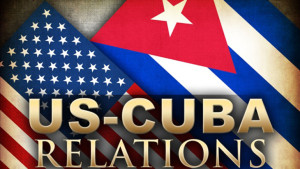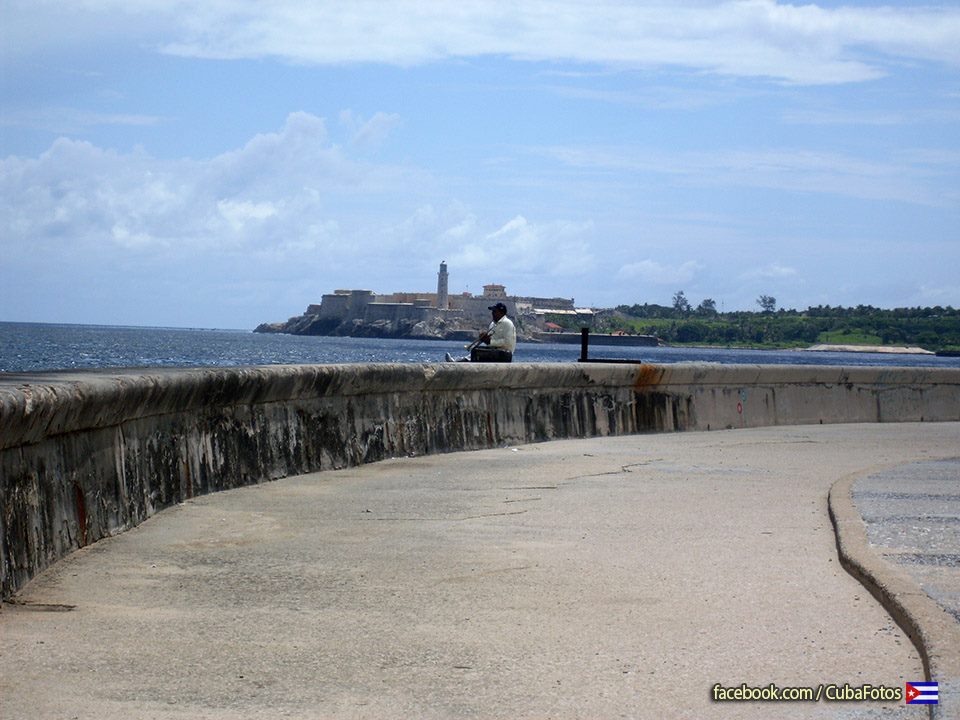A group of US Congressmen today concluded a visit to Cuba in which he advocated ending the embargo and the withdrawal of the island from the list of terrorist countries as key steps in establishing a mature and open relationship to all kinds of discussions, including human and civil rights.
Congressmen, all Democrats and led by the leader of that party in the House of Representatives, Nancy Pelosi, agreed on the need to “accelerate” the process to normalize diplomatic ties between the US and Cuba, for what they considered a priority the opening of embassies agreed in the next round of negotiations the parties held on February 27 in Washington.
“To accelerate the process must be open embassies as soon as possible and that our governments can communicate directly through them, to build a mature relationship where we can talk about everything but we disagree, including human rights,” said in press Press the legislator Jim McGovern.
The congressman acknowledged that for the opening of embassies, it is necessary that the United States undertakes to remove Cuba from the list of countries sponsoring terrorism and solve the banking problems of the Cuban legation in Washington, caused by the embargo policy in force since the sixties.
“That’s the way to start a process that is constructive and not based on accusations and finger pointing,” said McGovern, who considered it a “miserable failure” of US policy towards Cuba for over 50 years.
The Democratic leader Nancy Pelosi stressed the need to start as soon as possible a thorough debate in Congress about lifting the embargo, which has a “strong support” of representatives from both the Democratic and Republican, which “opens the door to move quickly in that case. ”
Pelosi leads the first delegation of the US House of Representatives traveling to Cuba since the announcement in December, the restoration of relations between the two countries a three-day visit in which met with Cuban Foreign Minister Bruno Rodriguez and the chief negotiator Josefina Vidal; well with Cardinal Jaime Ortega.
They also held meetings with members of the National Assembly of Cuba, with representatives of civil society and small entrepreneurs of the emerging private sector of the island; and is expected before returning home to meet with the “number two” of the Cuban government, Miguel Díaz-Canel.
“There have been three very productive days of meetings. We came with pride, courage and audacity of President Obama, eager to see the reaction of people in Cuba and we are impressed with what we hear about future expectations,” said Pelosi.
Congressman Eliot Engel said last December 17, “President Barack Obama took a giant step forward”, breaking with a policy of isolation of more than 50 years, so he considered that “the ball is now on the side of Cuba “.
“We want to see flourishing civil society in Cuba. (…) We are concerned about human and civil rights. This is a crucial issue to deal with, but it is important that the two countries move forward together in this direction,” said Engel, who is Vice President of the Foreign Relations Committee of the House of Representatives.
His colleague Steve Israel said that although the announcement of the restoration of diplomatic relations last December 17 was “historic” for both countries, “the true story is when things change.”
“I think the leadership of the two countries will be judged by those who dared to step forward, they looked to the future and thought changes,” he said.
In the debate on human rights and civil liberties that the US wants to promote with the Cuban authorities, the expansion of telecommunications is one of the cornerstones of its approach to the island, where internet penetration rate is 5%, one of the lowest in the world.
“I think young Cubans are hungry for internet because they are aware of empowerment derived from Internet-related tools. (…) We hope to help in this issue and make some changes soon in this regard,” said lawmaker Anna Eshoo.
The congressional delegation official visit to Cuba the completed Rosa DeLauro (Connecticut), Collin Peterson (Minnesota), Nydia Velázquez (New York) and David Cicilline (Rhode Island).
Agencies / MiamiCuba / InternetPhotos / TheCubanHistory.com
The Cuban History, Hollywood.
Arnoldo Varona, Editor.
MIEMBROS IMPORTANTES DEL CONGRESO DE EE.UU. PIDEN FIN DEL “EMBARGO” DE CUBA.
Un grupo de congresistas de EE.UU. concluyó hoy una visita a Cuba en la que abogó por el fin del embargo y la retirada de la isla de la lista de países terroristas como pasos clave para establecer una relación madura y abierta a todo tipo de discusiones, incluidos los derechos humanos y civiles.
Los congresistas, todos demócratas y encabezados por la líder de ese partido en la Cámara de Representantes, Nancy Pelosi, coincidieron en la necesidad de “acelerar” el proceso para normalizar los vínculos diplomáticos entre EE.UU y Cuba, para que lo que consideraron prioritario que se acuerde la apertura de las respectivas embajadas en la próxima ronda de negociaciones que las partes celebrarán el 27 de febrero en Washington.
“Para acelerar el proceso hay que abrir embajadas lo antes posible y que nuestros Gobiernos puedan comunicarse directamente a través de ellas, para construir una relación madura en la que podamos hablar de todo aunque estemos en desacuerdo, incluidos los derechos humanos”, afirmó en rueda de prensa el legislador Jim McGovern.
El congresista reconoció que, para la apertura de embajadas, es necesario que Estados Unidos se comprometa a retirar a Cuba de la lista de países patrocinadores del terrorismo y solucione los problemas bancarios de la legación cubana en Washington, causados por la política de embargo, vigente desde los años sesenta.
“Esa es la manera de comenzar un proceso que sea constructivo y no basado en acusaciones y en señalar con el dedo”, aseveró McGovern, quien consideró un “miserable fracaso” la política de EE.UU hacia Cuba durante más de 50 años.
La líder demócrata Nancy Pelosi hizo hincapié en la necesidad de iniciar cuanto antes un debate profundo en el Congreso sobre el levantamiento del embargo, lo que cuenta con un “fuerte apoyo” de representantes tanto del Partido Demócrata como del Republicano, lo que “abrirá la puerta a avanzar pronto en ese asunto”.
Pelosi lidera la primera delegación de la Cámara de Representantes de EE.UU que viaja a Cuba desde el anuncio, en diciembre, del restablecimiento de relaciones entre ambos países, una visita de tres días en la que se reunieron con el canciller cubano Bruno Rodríguez y la jefa negociadora Josefina Vidal; además de con el cardenal Jaime Ortega.
También sostuvieron encuentros con diputados de la Asamblea Nacional de Cuba, con representantes de la sociedad civil y pequeños empresarios del incipiente sector privado de la isla; y está previsto que antes de regresar a su país se reúnan con el “número dos” del Gobierno cubano, Miguel Díaz-Canel.
“Han sido tres días muy productivos de reuniones. Vinimos con el orgullo, la valentía y la audacia del presidente Obama, ansiosos por ver la reacción de la gente en Cuba y estamos impresionados con lo que hemos escuchamos sobre las expectativas de futuro”, subrayó Pelosi.
El congresista Eliot Engel afirmó que el pasado 17 de diciembre, “el presidente Barack Obama dio un paso adelante gigante”, al romper con una política de aislamiento de más de 50 años, por lo que consideró que “la pelota está ahora en el lado de Cuba”.
“Queremos ver prosperar a la sociedad civil en Cuba. (…) Nos preocupan los derechos humanos y civiles. Es un tema crucial que tratar, pero es importante que los dos países avancemos juntos en ese sentido”, aseveró Engel, quien es el vicepresidente del Comité de Relaciones Exteriores de la Cámara de Representantes.
Su colega Steve Israel subrayó que, aunque el anuncio del restablecimiento de relaciones diplomáticas del pasado 17 de diciembre fue “histórico” para los dos países, “la historia verdadera se hace cuando las cosas cambian”.
“Creo que el liderazgo de los dos países se juzgará por aquellos que se atrevieron a dar un paso adelante, miraron al futuro y pensaron en cambios”, precisó.
En el debate sobre derechos humanos y libertades civiles que EE.UU quiere promover con las autoridades cubanas, la expansión de las telecomunicaciones es uno de los ejes de su acercamiento hacia la isla, donde la tasa de penetración de internet es del 5 %, una de las más bajas del mundo.
“Creo que los jóvenes cubanos están hambrientos de internet porque son conscientes del empoderamiento que se deriva de las herramientas relacionadas con Internet. (…) Esperamos poder ayudar en este tema y que se produzcan cambios pronto en este sentido”, indicó la legisladora Anna Eshoo.
La delegación de congresistas de visita oficial en Cuba la completaron Rosa DeLauro (Connecticut), Collin Peterson (Minesota), Nydia Velázquez (Nueva York) y David Cicilline (Rhode Island).
Agencies/MiamiCuba/InternetPhotos/TheCubanHistory.com
The Cuban History, Hollywood.
Arnoldo Varona, Editor.





